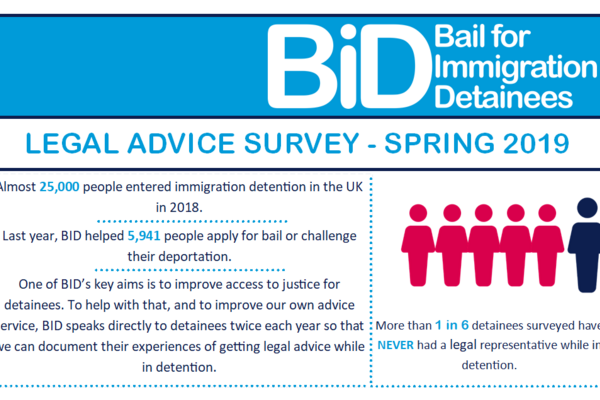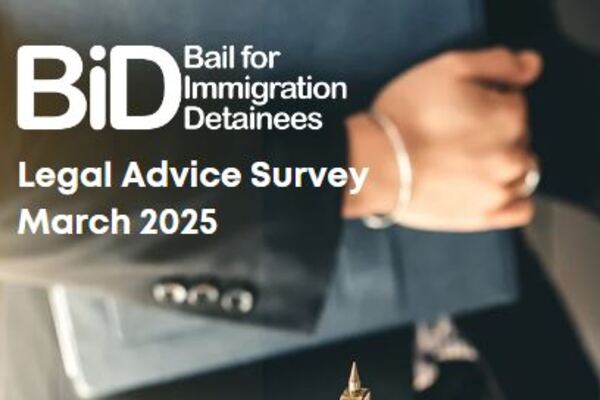New research published today by the charity Bail for Immigration Detainees gives rise to serious concerns about the quality of legal advice given to immigration detainees[1].
The survey, collected by charity Bail for Immigration Detainees, is the only data collected on the availability of legal advice and representation in immigration detention.
The level of legal representation was found to be higher than in previous years with 64% of those surveyed stating that they have an immigration solicitor (69% of those were represented by legal aid solicitors). However, these figures remain lower than those prior to the 2013 legal aid cuts, which removed non-asylum immigration work from the scope of legal aid.
Interviewees painted a damning picture of the quality of the legal advice surgeries. Of 51 individuals who made a legal advice surgery appointment with the duty solicitor, only 12 were given specific advice about their case. There were 12 individuals who were told by the solicitor that their case couldn’t be taken on because of reasons to do with eligibility for legal aid, and not a single one had been informed of the possibility of applying the Legal Aid Agency for Exceptional Case Funding. Only 43.1% of individuals who currently have a solicitor said that their solicitor had applied for bail.
It was clear that the legal advice surgeries have a poor reputation in detention. Numerous interviewees complained that the duty solicitors lacked knowledge and were not helpful, and one told us that they had not bothered to make an appointment after being repeatedly told by other detainees that it would be a waste of time.
Other important findings:
- Half of those who did not have a lawyer said that it was because they couldn’t afford one (or weren’t eligible for legal aid
- 22 individuals said that on at least one occasion in the past they had been forced to change solicitor as a result of being moved from one IRC to another.
- Of those who made an appointment to see the solicitor in detention, more than half were waiting over a week for an appointment
- Out of 28 individuals who said that they had used the internet to research their case, 22 reported that blocked websites in detention had made this more difficult
In September 2018 the Legal Aid Agency made significant changes to the contracts governing the provision of legal advice at surgeries in detention centres. There was a significant increase in the number of providers of immigration advice, and where under the previous contracts a single firm would have provided around 20-25 weeks of legal advice surgeries, now each firm will run surgeries over one or two weeks year in any given detention centre. The vast majority of providers have never run DDA surgeries in the past and lack experience of detention work, and are not running surgeries regularly enough to develop expertise in this area. BID is concerned that this has contributed to a decline in the quality of advice.
Once again a major concern was the complete lack of legal aid immigration advice in prisons. Out of 43 people in the survey who said that they were held in prison before being moved to a detention centre, only 3 (7%) had received immigration advice whilst in prison. One interviewee, who had been forced to challenge his deportation by using the prison library to familiarise himself with immigration law, said that ‘help in prison is non-existent for immigrants’.
Celia Clarke, BID’s director, said “The Home Office acts as judge, jury and executioner in stripping immigration detainees of their rights, their liberty, and their basic dignity. The results of our Legal Advice Survey show that such disadvantage is compounded by multiple and systemic barriers to accessing justice. We demand the reinstatement of legal aid for all immigration cases and an end to the inhumane system of immigration detention.”
[1] The Spring 2019 Survey is the 17th conducted by BID since BID first began surveying immigration detainees in 2010 twice a year regarding their access to legal representation. A total of 77 detainees were interviewed in April 2019. Detainees held in prisons were not included in this interview sample. 88% (n=68) were male and 12% (n=9) were female. The sample were detained at the following IRCs: Brook House (n=18); Colnbrook (n=14); Harmondsworth (n=25); Morton Hall (n=10); Yarl’s Wood (n=9).









